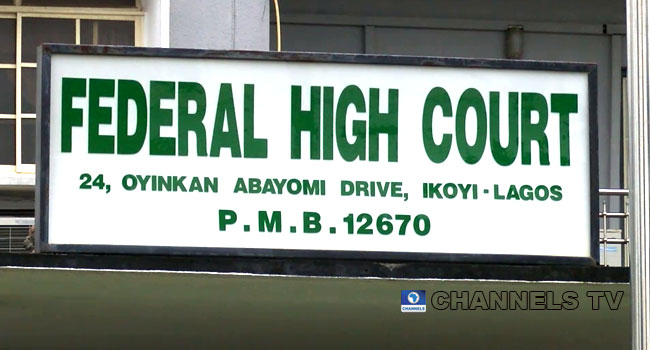Alleged Money Laundering: Ex-Lagos Speaker, Ikuforiji To Open Defence March 24

![]()
A Federal High Court sitting in Lagos has fixed March 24 for the former Speaker of the Lagos State House of Assembly, Hon. Adeyemi Ikuforiji, to open his defence in an alleged ₦338.8 million money laundering trial.
Justice Mohammed Liman set the date on Wednesday after the Economic and Financial Crimes Commission (EFCC) closed its case.
Counsel to the former Speaker, Mr Dele Adesina, SAN, had asked the court for a short date to either open his defence or in the alternative to file a no-case submission.
The judge granted his request.
Ikuforiji is standing trial alongside his former Personal Assistant, Oyebode Atoyebi, on a 54-count charge bordering on the alleged offences.
They pleaded not guilty before Justice Mohammed Liman last December 11 and were allowed to continue on a ₦500 million bail granted to them in 2012 when they were first arraigned.
The EFCC had closed its case against the defendants after the testimony of its second and final witness, Adewale Taiwo Olatunji.
Led in evidence by EFCC counsel, Mr Ekene Ihenacho, the witness, Olatunji, described himself as a retiree and former clerk of the Lagos State House of Assembly (HoA).
Olatunji, 70, identified the former speaker and his personal assistant in the dock.
He recalled receiving two letters from the EFCC; the first concerned the agency’s intention to investigate the HoA’s financial dealings. The second was an invitation to him to appear before the Commission in relation to the investigation.
“When they came, I directed the staff of the house to cooperate with them and give them what they required,” Olatunji said, adding that he later honoured the invitation at the EFCC’s Abuja headquarters.
The witness confirmed that he was aware that the EFCC officials demanded for and were given documents.
“The documents were majorly cash registers,” he said.
Upon being shown one of the documents – which were in the court’s possession as exhibits – the witness Identified the same as a certified true copy of a cash register forwarded to EFCC by the HoA.
“Cash registers were majorly to record cash transactions,” Olatunji told the judge.
Responding to a question by Iheanacho, he confirmed that in his time, the HoA had five accounts, but could not recall all of them.
“It was a long time ago. We had WEMA Bank, Equitorial Trust Bank, Skye Bank, which had two accounts,” Olatunji said, adding that he was not aware if any of the banks had branches within the HoA complex in Alausa.
Iheanacho: “Who approved payments in the exhibits?
Olatunji: “The Speaker had power to approve. Speaker approved all expenditures above N50,000. The Honourable Adeyemi Ikuforiji was the Speaker at the time.”
Iheanacho: “Thats all for the witness.”
During cross examination by Adesina, the witness summarised his testimony.
Adesina: “All you’ve said concerning the first defendant is that he was the speaker and approving authority.
Witness: “Yes.”
Adesina: “The banks you mentioned, did they have branches within Alausa?
Witness: “I wouldn’t know.
Adesina: “The House of Assembly and state secretariat are in same vicinity of Alausa?”
Witness: “Yes”.
Adesina: “You made a statement in respect of this matter with the EFCC?
Witness: “Yes.”
Adesina: “That will be all for this witness.”
The defendants were first arraigned on March 1, 2012 before Justice Okechukwu Okeke on a 20-count charge bordering on misappropriation and money laundering.
They had each pleaded not guilty to the charges and were granted bail.
Following a re-assignment of the case, the defendants were, subsequently re-arraigned before Justice Ibrahim Buba.
Justice Buba granted them bail in the sum of N500 million each with sureties in like sun
On Sept. 26, 2014, Justice Buba discharged the defendants after upholding their “no case submission applications”.
The judge had held that the EFCC failed to establish a prima-facie case against them.
Dissatisfied with the ruling, the EFCC through its counsel, Mr Godwin Obla (SAN), filed a Notice of Appeal dated Sept. 30, 2014 challenging the decision of the trial court.
Obla had argued that the trial court erred in law when it held that the counts were incompetent because they were filed under Section 1(a) of the Money Laundering (Prohibition) Act, 2004 which was repealed by an Act of 2011.
The EFCC further argued that the lower court erred in law when it held that the provisions of Section 1 of the Money Laundering (Prohibition) Act, 2004 and 2011, only applied to natural persons and corporate bodies other than the Government.
The commission had also submitted that the trial judge erred in law when he held and concluded that the testimonies of the prosecution witnesses supported the innocence of the respondents.
In its judgement, the Lagos Division of the Appeal Court, in November 2016, agreed with the EFCC and ordered a fresh trial of the defendants before another judge.
Following the decision of the Appeal Court, the defendants headed to the Supreme Court, seeking to overturn the ruling of the Appellate court.
In its verdict, in December 2017, the apex court upheld the decision of the appellate court and ordered that the case be sent back to the Chief Judge of the Federal High Court for reassignment to another judge.
This necessitated the current re-arraignment and re-trial before Justice Liman.
In the charge, the EFCC alleged that the defendants accepted cash payments above the threshold set by the Money Laundering Act, without going through a financial institution.
The commission also accused the defendants of conspiring to commit an illegal act of accepting cash payments in the aggregate sum of N338.8 million from the House of Assembly without going through a financial institution.
Ikuforiji was also accused of using his position to misappropriate funds belonging to the Assembly.
The EFCC said that the defendants committed the offences between April 2010 and July 2011.
The offences, according to the EFCC, contravenes the provisions of Sections 15 (1d), 16(1d) and 18 of Money Laundering Act, 2004 and 2011.


